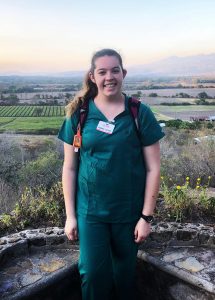When Sabrina Lacasse first arrived at Castleton, she didn’t know what to expect. She knew she wanted to be a nurse, but the first-generation college student was nervous about forms, deadlines, and other facts of college life. In addition, Sabrina was apprehensive about leaving home. She’d grown up on a small farm in tiny Elmore, Vermont, and she wasn’t sure how she’d handle being away from family.
Fortunately, another family awaited Sabrina at Castleton. Through Summer Transition Program (STP), a weeklong pre-college experience for new TRIO students, she made valuable connections. “STP helped me tremendously,” Sabrina recalls. “I learned where everything was before classes started, and I made friends.” STP also introduced Sabrina to the Academic Support Center’s full-time staff.
But settling in was just the beginning of Sabrina’s journey. Despite the warm STP welcome, Sabrina was often homesick. And although she worked hard, the nursing program proved daunting. Finally, like most college students, Sabrina wanted to earn good grades, have a social life, and get sufficient sleep. Balance seemed elusive.
Whenever obstacles arose, Sabrina met with Academic Support Center staff, a practice she continues today. “They say, ‘Take a deep breath; this is what you have to do,’” she chuckles. “And I feel better.”
Today, it’s hard to reconcile the relaxed, self-assured young woman with the shy girl who entered STP. Sabrina maintains a 3.30 GPA while juggling part-time jobs at the Campus Center and Academic Support Center. She plays club basketball and is an active member of the Rotaract Club.
Despite Sabrina’s success, she hasn’t forgotten her rocky start. As an STP and TRIO Texting Mentor, she nurtures and encourages new students, many of them first-generation students who are anxious about entering a new world. “She inspires new students with her positive attitude and by sharing her personal experiences,” says Kelley Beckwith, Director of Academic Services.
Sabrina loves seeing her mentees grow; some have even become leaders themselves. “Sometimes, they come up to me and say, ‘If it wasn’t for STP, I wouldn’t be here,’” she says. “Some still call me Mom.”
At Castleton, Sabrina’s compassion has taken her far, even out of the country. Last year, Sabrina and her fellow nursing students traveled to Honduras to provide care for people in underserved communities. It was Sabrina’s first trip outside the U.S. – and her first time flying. “I was way out of my comfort zone, but it was the best experience,” she says. “It reminded me of why I want to be a nurse.” This spring, Sabrina will travel to Florida to volunteer with the Rotaract Club.
Sabrina’s adventures have whetted her appetite for travel. After graduation, she plans to pursue a career as a traveling nurse. Eventually, she hopes to settle in her beloved Vermont, where she would like to work as an emergency room or birthing center nurse. Her Castleton family is confident she’ll succeed. “Her manner as a mentor indicates she’ll make a wonderful nurse,” says Becky Eno, Academic Counselor.
Sabrina hopes new students will find a home at Castleton and take advantage of all the university has to offer. “Ask for help if you need it,” she advises. “As a first-year , I was too shy to ask for what I needed – now I do it all the time. And get involved on campus. It can lead to all sorts of opportunities.”
-Dorothy A. Dahm


